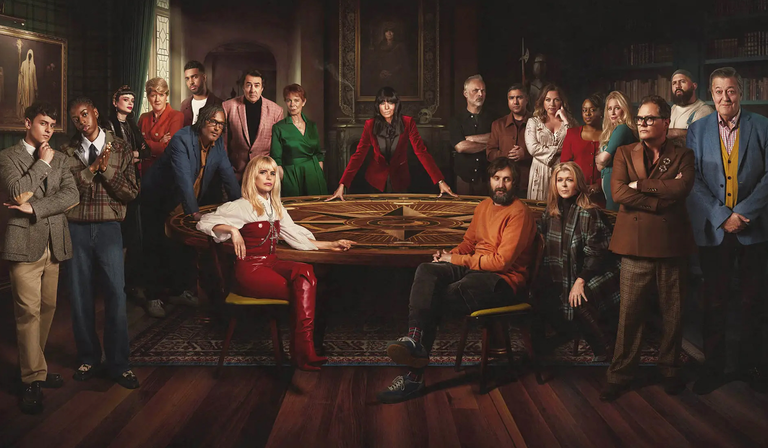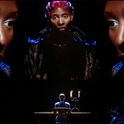In many ways, The Celebrity Traitors has not disappointed. There was Celia Imrie’s stress-induced fart during one of the challenges, Nick Mohammed’s almost frighteningly quick puzzle-solving, GB golden boy Tom Daley’s inner bitch on free rein, and Alan Carr’s startlingly rapid transformation from a sweaty and suspect traitor, destined for banishment at any moment, into a devious master of deceit. At the time of writing, just after the airing of episode eight of nine, the celebrity faithful are doing a rotten job. They have managed to lose 13 of their number and have caught just a single traitor, but that in itself has been appealingly maddening to watch.
While The Traitors US has yet to do a season without celebrities—which probably says something about US audiences that I can’t be bothered to unpick here—this is the first time we’ve seen famous people playing the beloved game here in the UK. And the game is different for it in various ways. For one, the regular Traitors series, in which neither the audience nor the players have ever seen these people before, allows for fun reveals: the iconic twist that Diane was Ross’s mother on season two, for example. Obviously, everyone knows that Clare Balding is not secretly Tom Daley’s aunt or whatever, so the producers must manage without this kind of suspense to exploit. But there is another, bigger issue with The Celebrity Traitors, one which the players worked out relatively early on: the celebrities are all bringing their own knowledge of each other into the game.
This season has featured some truly household names: Stephen Fry, Jonathan Ross and Celia Imrie, for instance. The two Joes—comedian Joe Wilkinson and former England rugby union player Joe Marler, an example of an archetype I hadn’t quite identified before that the writer Caroline O’Donoghue has termed the “thoughtful meatball”—were two originators of a line of thinking that became known as “Big Dog Theory”. The Traitors is a television show and, in order to make the best possible television, they reasoned, the producers would almost certainly have selected at least one of the really, seriously famous players to be a traitor.
They were correct. It wouldn’t have been much of a season if three of the people who stretch the definition of “celebrity” furthest had been chosen as the traitors. Not that working this out has helped the faithful very much. Somehow Jonathan Ross, a traitor so obvious he may as well have been wearing that cloak at the breakfast table, evaded being banished until episode seven. But the theory proved sound, and might just be Alan Carr’s undoing as well.
The twist is visible from a distance of several nautical miles...
But “Big Dog Theory” isn’t just a flaw in The Celebrity Traitors. There’s a new straight-to-Netflix film called The Woman in Cabin 10, in which Keira Knightley plays an investigative journalist for the Guardian. She finds herself on a superyacht doing what she hopes is a puff piece on a new charitable fund being set up by the dying wife of a 1 per center; this assignment comes in the aftermath of a source on a previous, more heavy-hitting piece being murdered for her involvement in the investigation. One night, Knightley’s character hears a fight break out in cabin 10, the adjacent cabin to hers, and sees a woman fall overboard. She is then told that—gasp — there was no woman staying in cabin 10. The film is middling. The spoiler sensitive should avert their eyes here, but the twist—that the billionaire owner of the innately villainous superyacht is in fact the villain of the tale—is visible from a distance of several nautical miles. Partly this is because it’s not a particularly well-written murder mystery, but partly it’s because the billionaire in question is played by Guy Pearce. As in, Hollywood superstar Guy Pearce, easily the most famous person in the cast other than Knightley herself.
I would think that most viewers are at least a little aware of how casting works. It makes intuitive sense that you lure a huge star like Guy Pearce to do a film like this with the offer of a really meaty role, the sort with which playing one of a clutch of possible suspects in an ensemble cast simply can’t compare. Ergo, they got him by offering him the part of the villain. I would argue that the Knives Out films have fallen foul of this plot-revealing issue too. Otherwise, what was Chris Evans, the literal Captain America and one of the biggest blockbuster stars in the world, doing as the affable but forgettable brother in the first film? Same goes for Ed Norton in the second. Clueless tech mogul would have been a fun, easy role, but not a juicy one for an actor with his chops and prestige. I’m not sure how you fix this, in practical terms. Big actors want big roles, it is what it is. But it’s disappointing when you settle down to a whodunnit, spot an acting heavyweight among the B-listers and get that gut feeling that the plot has been ruined from the off.
Maybe the way to really throw the cat among the pigeons in further Traitors instalments is to mix the celebs with the normies. I, for one, would love to see a mother of three from Godalming colluding with, I don’t know, Alison Steadman and Skepta to bump off an estate agent.












